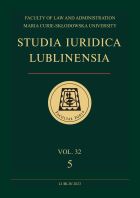The Idea of Civil Disobedience: A Few Words after the Judgment of the Voivodeship Administrative Court in Opole (II SA/Op 219/20) and the Judgment of the Supreme Administrative Court (II GSK 292/21)
The Idea of Civil Disobedience: A Few Words after the Judgment of the Voivodeship Administrative Court in Opole (II SA/Op 219/20) and the Judgment of the Supreme Administrative Court (II GSK 292/21)
Author(s): Justyna Kulikowska-KuleszaSubject(s): Human Rights and Humanitarian Law, Health and medicine and law
Published by: Wydawnictwo Naukowe Uniwersytetu Marii Curie-Sklodowskiej
Keywords: SARS-CoV-2 coronavirus pandemic; civil disobedience; economic freedom; entrepreneurs;
Summary/Abstract: The global SARS-CoV-2 coronavirus pandemic carried a number of restrictions and prohibitions, the manifestation of which in Poland was, i.a., cyclical closing and opening of selected branches of the economy, which for the vast majority of entrepreneurs meant – at best – an uncertain future. The lack of clear and consistent actions when introducing restrictions and bans by the Polish Council of Ministers, as well as the failure to provide real financial aid, resulted in the growing opposition of many entrepreneurs, which in turn translated into breaking or circumventing the applicable regulations regarding restrictions and prohibitions in the field of economic freedom. Can such an action be considered a manifestation of civil disobedience? The author’s attempt to obtain an answer to this question is the result of the judgment of the Voivodeship Administrative Court in Opole of 27 October 2020 (II SA/Op 219/20), which for many Polish entrepreneurs was an excuse to express their civic objection and open a business against applicable restrictions and limitations, as well as the judgment of the Supreme Administrative Court of 28 August 2022 (II GSK 292/21).
Journal: Studia Iuridica Lublinensia
- Issue Year: 32/2023
- Issue No: 5
- Page Range: 265-285
- Page Count: 21
- Language: English

